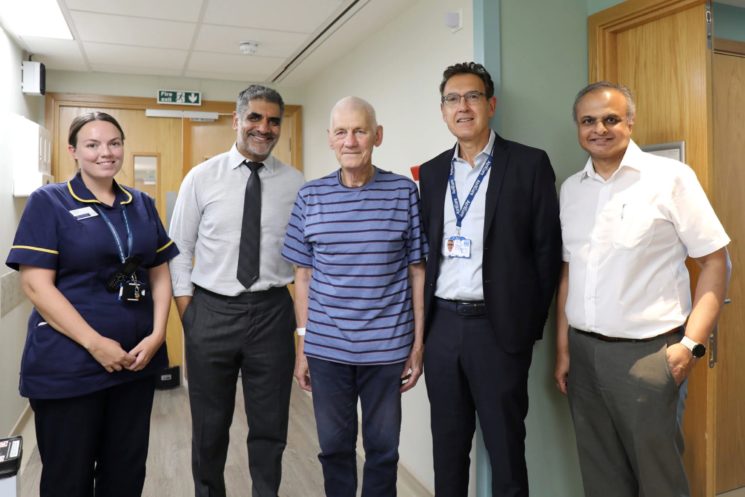
Cardiologist Dr Rakesh Sharma talks about the differences in men’s and women’s hearts and how you make sure you stay heart healthy.
Heart disease affects women
World Heart Day, observed every September, serves as a crucial reminder for everyone to prioritise cardiovascular health. Despite prevailing misconceptions associating heart disease primarily with overweight men, it is imperative to acknowledge its impact on women. Shockingly, heart disease claims the lives of approximately one in eight women, surpassing the the mortality rate of breast cancer by more than threefold.
In the realm of heart health, awareness plays a pivotal role. It’s not just a concern for men; it affects women as well. While breast cancer may dominate the fears of many women, understanding and recognising the symptoms of heart disease is equally vital. As we navigate the complexities of heart health, seeking expert guidance and considering options like heart surgery or heart monitoring at a reputable Heart Hospital in London becomes increasingly significant. Expertise from a skilled Heart Surgeon, as well as procedures like Heart Bypass Surgery or Open Heart Surgery, can contribute to effective management and treatment.
Remember, your heart’s well-being is not gender-specific, and being proactive about heart health is a universal imperative. Whether you are concerned about general heart health or considering specific interventions like Heart Surgery in London, empowering yourself with knowledge and seeking the right medical expertise can make a significant difference.
Women’s hearts are different than men’s
Women’s hearts are different to men’s. They are smaller and they beat faster – so women can experience different symptoms. The public tend to think of heart disease manifesting itself as someone falling to the ground, clutching their chest. But it doesn’t always work like that. In addition to classic symptoms such as crushing chest pains, shortness of breath and sweating, women can often present with less typical symptoms, such as:
neck and jaw pain
upper back pain
abdominal pain, like indigestion
nausea and fatigue
Worryingly, because women are often unaware that these symptoms may be cardiac in origin, they are less likely to seek medical help and advice when they need to, meaning that often they present at a later and more serious stage of the disease.
Keep your heart healthy
The positive news is that there is a multitude of actions women can take to diminish their risk of developing heart disease. Various risk factors, including smoking, high cholesterol, diabetes, and high blood pressure, can be effectively addressed. Women who have undergone menopause face an elevated risk of heart disease, emphasising the need to proactively address these factors early on to minimise their risk. Here are some valuable tips for maintaining heart health:
1. Seek Expert Guidance at a Heart Hospital in London:
Regular consultations with a specialised Heart Surgeon or at a reputable Heart Hospital can provide personalised insights and recommendations tailored to your heart health.
2. Utilise Hospital Heart Monitor Services:
Incorporate regular monitoring with Hospital Heart Monitor services to track your heart’s performance and detect potential irregularities at an early stage.
3. Consider Heart Bypass Surgery or Open-Heart Surgery if
Necessary:
In cases where intervention is required, explore options like Heart Bypass Surgery or Open-Heart Surgery, performed by skilled professionals.
4. Adopt a Heart-Healthy Diet:
Modify your eating habits to lower cholesterol and blood pressure. Consume three to five servings of fruits and vegetables daily, reduce salt and sugar intake, and consider incorporating omega-rich foods like oily fish.
5. Embrace Regular Exercise:
Make exercise a regular part of your routine – aim for 150 minutes of moderate exercise per week. Simple changes, like taking the stairs or walking, can significantly contribute to heart health.
6. Quit Smoking:
Cease smoking to experience immediate health improvements. Within a year of quitting, your heart attack risk is halved, and after fifteen years, it reaches the level of someone who has never smoked.
If you suspect any symptoms of heart disease, consult your GP. In the case of new-onset chest pain, call for an ambulance. Timely diagnosis is crucial for effective management and treatment of heart disease.
Dr Rakesh Sharma is a cardiologist at Cromwell Hospital.
Explore more expert tips for keeping your heart healthy.
Why Choose Us?
At Cromwell Hospital, we stand out as a beacon of excellence in heart care. Our commitment to your cardiovascular health is unwavering, making us the preferred choice for comprehensive and compassionate cardiac services. Here’s why you should choose us:
1. Expert Heart Surgeons:
Our team comprises skilled Heart Surgeons with a wealth of experience, ensuring
top-tier care and successful outcomes.
2. Cutting-Edge Facilities:
Equipped with state-of-the-art technology, our hospital provides advanced
diagnostics, precise monitoring, and innovative treatments.
3. Personalised Care: We
prioritise your unique needs, offering personalised treatment plans tailored to
your specific heart health requirements.
4. Heart Hospital of Choice:
As a leading Heart Hospital in London, we have earned trust through a proven
track record of delivering exceptional cardiac care.
5. Comprehensive Services:
From routine check-ups to complex procedures like Heart Bypass Surgery and Open-Heart Surgery, we cover a spectrum of cardiac services under one roof.
Come to our heart and lung centre for unparalleled expertise, advanced technology, and a patient-centric approach to ensure your heart health is in the best hands.

